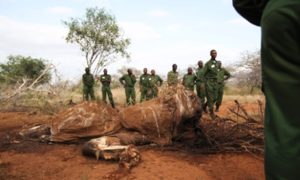
Aside from the well-documented ivory trade of up to around $400 million a year that trickles to some militias in East, Central and West Africa, the annual trade of up to $100 billion in illegal logging is helping line the pockets of mafia, Islamist extremists and rebel movements, including Somalia’s Al-Qaeda-linked terror group al-Shabaab, which now relies on charcoal as its primary finance.
Christian Hellemann, who led the U.N. Environment Program assessment, said the scale of the illegal timber trade “has been totally underestimated and is now being regarded as very significant,” beyond concerns over deforestation, destruction of animal habitats and the threats to precious woods such as rosewood, sandalwood and mahogany.
In Africa alone, governments are losing at least $1.9 billion a year from charcoal, to the benefit of criminals earning up to $9 billion – three times the value of drug trade on the continent. “This number is likely to triple in the coming decades and we believe that the scale of logging in Africa alone would be equivalent in a few decades from now to what has been logged in the Amazon, just to sustain charcoal trade,” said Hellemann.
Al-Shabaab, which last week claimed responsibility for the slaughter of 64 people in attacks on villages near a popular Kenyan coastal resort and the September siege of an upmarket mall in the capital of Nairobi that killed around 70 people, earns between $38 million and $68 million a year from charcoal sales and taxation.
“There is a desperate need for addressing the scale and destinations and routes regarding the charcoal trade,” said Hellemann. Charcoal accounts for up to $289 million of “threat finance” to organized criminals, terrorists and militias per year, compared to up to $12 million in ivory.
Militias in the Central African Republic and the Democratic Republic of Congo, as well as the “Janjaweed” fighters on horseback spreading terror across Sudan, Chad and Niger, have all profited from the ivory trade, that was once the primary source of funding for the notoriously brutal Lord’s Resistance Army in Uganda.
Read the full story at theguardian.com


